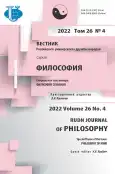Modernization of Higher Education for Tourism and Hospitality in Contemporary Conditions: Socio-Philosophical Analysis
- Авторлар: Gerneshiy V.V.1
-
Мекемелер:
- Рeoples’ Friendship University of Russia (RUDN University)
- Шығарылым: Том 26, № 4 (2022): PHILOSOPHY OF MIND
- Беттер: 882-895
- Бөлім: INTERDISCISCIPLINARY STUDIES
- URL: https://journal-vniispk.ru/2313-2302/article/view/325301
- DOI: https://doi.org/10.22363/2313-2302-2022-26-4-882-895
- ID: 325301
Дәйексөз келтіру
Толық мәтін
Аннотация
The article presents the results of the theoretical generalization of approaches to modeling modern tourism education as a socio-cultural phenomenon, which has entered the stage of new development under the influence of social needs and external influences. It is indicated that because of socio-political and economic changes in the world, the domestic tourism industry has been affected by numerous negative heterogeneous and multidirectional factors. This situation has led to quite profound transformations in the Russian tourism industry. It is emphasized that now the industry business community makes higher demands on the professional level of employees as a key factor in the effective operation of industry’s enterprises and their development in changing socio-economic conditions. The professional community notes the urgent need for growth in public understanding of the prestige of both the tourism industry itself and tourism professional education. The article emphasizes that the domestic tourism industry will require significant quantitative changes in personnel potential in the coming years. The quality of training should ensure the formation of competencies that allow the effective use of the created infrastructure to create a level of service that meets the expectations and demands of consumers of tourist services. The author notes that the transformation of the domestic tourism industry predetermines the change in models of tourism education. The formation of tourist education models is considered through the interconnection of educational content mastered by students and learning activities, providing high-quality and complete learning. The article provides a socio-philosophical analysis of the main models of tourism education in Russia, highlighting some general disadvantages and advantages of each model. The variety of methodological tools used in contemporary training of specialists in tourism and hospitality, considering modern conditions of transition to intensive development of domestic tourism, is traced.
Авторлар туралы
Vasiliy Gerneshiy
Рeoples’ Friendship University of Russia (RUDN University)
Хат алмасуға жауапты Автор.
Email: gerneshiy-vv@rudn.ru
ORCID iD: 0000-0003-3288-814X
Candidate of Military Sciences, Associate Professor, Director of the Hotel Business and Tourism Institute
6 Miklukho-Maklaya St, Moscow, 117198, Russian FederationӘдебиет тізімі
- Shashkova SN. Transformatsiya funktsii vysshego obrazovaniya v sovremennoi Rossii [Transformation of higher education functions in modern Russia]. Izvestiya Tul’skogo gosudarstvennogo universiteta. Gumanitarnye nauki. 2022;1:27—33. (In Russian).
- Shibanova EK. Modelirovanie sistemy vysshego obrazovaniya: zarubezhnyi opyt i rossiiskie tendentsii [Modeling the system of higher education: foreign experience and Russian trends]. Sovremennye problemy nauki i obrazovaniya. 2015;4:3—7. (In Russian).
- Chistyakova OV. Etnicheskii turizm kak poznanie drugogo [Ethnic tourism as cognition of another]. RUDN Journal of Philosophy. 2020;24(4):720—729. (In Russian).
- Efimov VS., Lapteva A.V., Dadasheva V.A. et al. Typology of universities, models, and tools of organizational development. Krasnoyarsk: Sibirskii federal'nyi universitet; 2018. (In Russian).
- Konstantinova LV., Shubenkova EV., Gagiev NN. et al. Trends in the development of higher education in the world and in Russia. Analytical report. Moscow: Rossiiskii ekonomicheskii universitet imeni G.V. Plekhanova; 2021. (In Russian).
- Chistyakov DI. Informatsionnoe obshchestvo i mass-media v kommunikativnom prostranstve sovremennosti [Information society and mass-media in communicative space of modernity]. RUDN Journal of Philosophy. 2013;(2):173—179. (In Russian).
- Popova OI. Transformatsiya vysshego obrazovaniya v usloviyakh tsifrovoi ekonomiki [Transformation of Higher Education in the Digital Economy]. Voprosy upravleniya. Upravlenie v obrazovanii. 2018;5(54):158—160. (In Russian).
- Pirogova OV. Perspektivy razvitiya turistskogo obrazovaniya [Prospects for the development of tourism education]. Sovremennye problemy nauki i obrazovaniya. 2020;6:23—34. (In Russian).
- Kuznetsova EA. Otsrochennoe vysshee obrazovanie: kak izmenyatsya rossiiskie universitety [Deferred Higher Education: How Russian Universities Will Change]. Forbes Education Contributor. 2021:12—15. (In Russian).
Қосымша файлдар









